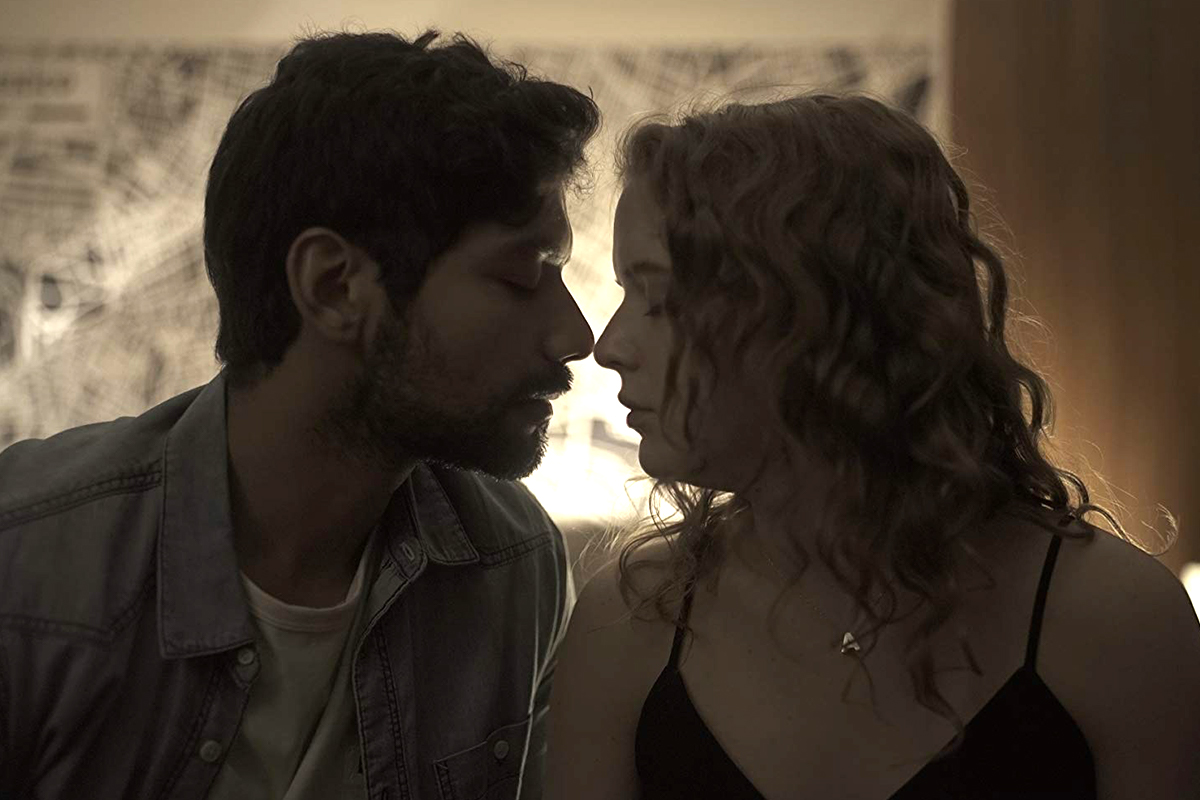Isaac Cherem’s directorial debut, Leona, opens on a sunlit mikveh. This is the tevilah, a full-body immersion into a ritual bath, of Rebeca (Ana Kupfer), and it’s a joyful occasion. As she dunks into the water, the bride-to-be splashes the retinue of women who watch her undergo this rite, breaking the moment’s solemnity. It’s refreshing to see the Jewish ritual treated so cinematically, and to see the intimacy and playfulness of these women depicted onscreen.
But even in that first image, we’re held at a distance: the women and the water are separated from us by a gauzy curtain. And the film is not about Rebeca — our protagonist is Ariela, the only one of her friends who isn’t married yet.
From the start, Ariela (played by Naian González Norvind) is apart. Her performance and Cherem’s framing ensure that she somehow always feels on her own. She can’t wait to shed the dress she’s wearing, changing into jeans in her car the moment the ceremony is over so she can return to her natural habitat: the streets of Mexico City, where she creates original murals.
As she paints the wall of a building, a young man, Ivan (Christian Vazquez) asks her how long it takes her “to paint something that big.” This flirtatious meeting sets off the events of the film: Ariela finds herself caught between her first love — a non-Jew — and the community she’s always known. Per Remezcla, she is “whisked away from upscale Mexico City neighborhoods like Polanco and Bosques de las Lomas to the bohemian streets of Coyoacán and Juárez. Ariela glows as she eats tacos al pastor, downs mezcal at cantinas and dances to cumbia into the night. The central theme of the film shifts quickly from a forbidden love story to a question of belonging. Is blood thicker than desire, love and passion?”
“As soon as she meets him,” Norvind tells Alma, “he opens her eyes to a totally new world, Aladdin-style. She goes against her own fear of disappointing her community.”
The film is largely set in the Syrian Jewish community in Mexico City where Cherem grew up. He wrote the first draft based on an experience he had soon after moving out on his own for the first time at 23. His parents were against his departure, worried that he would “get into hard drugs” or that he was “taking a step backwards.” When two of his friends — one Jewish and one not — were struggling to navigate their romantic relationship, the seed of Leona (which means “lioness”) was planted.
“Talking to both of them as their confidant and knowing both sides of the story, it was very emotional to me to see how difficult their relationship was,” Cherem says. “At the time, I didn’t realize that I was writing about myself, too.”
He chose to make his protagonist female because the expectations for women made the film’s central conflict “more dramatic. In the community, women are supposed to be the ones to hold the family together. And guys can do something else. But women are the ones that have to bring them back. It had to be a woman, because it’s way harder.” He reached out to Norvind not only to star, but to co-write a new draft. The two began collaborating over two years before the film was shot. Norvind told me she’s responsible for one of my favorite things about the film: “I suggested Ariela have curly hair.”
Those kinds of details pepper Leona, giving it an authentic and confident feel. The ways in which the non-Jews in the film subtly other the Jewish characters also rings true: “Are you very Jewish?” Ivan asks Ariela, and I recognized something in the quiet way that she, bristling so slightly you can almost miss it, says, “normal.” When Ariela and Ivan’s relationship begins to hit roadblocks, Ivan’s friend asks him why he can’t just “get a normal girl.” (Ariela’s family’s inability to respect boundaries may also feel familiar to many Jewish offspring.)
I didn’t know much about the Syrian-Jewish Orthodox population in Mexico City, which Leona presents “as wealthy, insular and ruthlessly protective of its traditions,” per JTA. “The city’s large Orthodox community, made up of two factions, one descended from Damascus, the other from Aleppo, has become wealthy over its century and a half in Mexico, where they arrived as poor immigrants and over time established themselves financially. The community is also notoriously sectarian … members would not even mingle much with those from the other city, whether it was Damascus or Aleppo. That has eased up over the decades — for instance, Cherem’s father is from the Aleppo community, while his mother is from the Damascus one. (But Cherem said his father’s mother-in-law used to try to make him feel inferior as an Aleppo descendant.)”
There’s no doubt that Leona is critical of this community. I felt Cherem’s experience at the Shabbat dinners of his youth, “always being angry at anything that was traditional,“ in the stifling weight of the film’s Shabbat scenes. But the nuances within Cherem’s depiction make for compelling storytelling. The realities of community life unfurl slowly, without too much heavy exposition. The history of Syrian Jews in Mexico is deployed pretty late in the film, as a strategy a character employs to bring Ariela back into the fold, making it all the more painful and memorable. The Jewish alternative suitor to Ivan isn’t a pure villain. And Ariela is initially close with her mom, making their subsequent ruptures really hurt.
The film remains a decidedly Jewish film, and its casting very much grew out of Jewish geography. Cherem met one actor while looking at an apartment with the same friend who inspired the film. “And the guy that was showing it to her was this guy, this Jewish guy. And he was like, Oh, who’s your dad? And who’s your cousin? Yeah, I know him. You don’t have to give me a deposit. Because I know your I know your dad, you know? And he was like, What do you guys do? It’s like film? Oh, yeah, I’d love to act, he said.” The man who plays the film’s rabbi was scouted at an Orthodox wedding. Cherem also held a casting session in his old neighborhood, from which he cast many of the film’s minor roles.
Though Norvind, who plays Ariela, isn’t Jewish, even the way Cherem cast her feels like it is: He got her number from her mom. (A funny film-life parallel: Ariela asks her family members not to give her number out to potential suitors without her consent. But in the case of Leona, it worked out for the best.)
Making Leona introduced Norvind to a deeper understanding of Judaism. She explored Cherem’s former world much as Ariela explores Ivan’s. “It was an amazing experience to have this world shown to me, in an inverse way to what Ariela discovers. My friend took me to a Jewish temple for Shabbat before filming, I went to a tevilah with Ana [Kupfer, who plays Rebeca]. It was a definite immersion in the culture, and I was… very beautifully welcomed. As much as the film criticizes so many aspects of Jewish culture, I also learned about all the wonderful things it has, and what a sense of camaraderie there is, and how much they support each other.”
The film’s complex relationship with Jewishness followed it all the way through its release. Cherem expected Leona to play at the major Jewish film festival in Mexico City, but after an enthusiastic response from a programmer, the festival ultimately declined, afraid that the film would cost it sponsors. Cherem wrote about the rejection on Twitter, and his tweets went viral, leading to interviews and free publicity. In a funny twist, this ultimately helped the film find its audience, even within the community it scrutinized: “I premiered it on Vimeo on Demand in Mexico in December. And it was rented so many times, because the whole community was incredibly curious to see and to react. That controversy sparked a fire. That’s the good thing about the community being so tight: They all want the gossip.”
At those tough Shabbat dinners, Cherem knew he was getting through to his family on a provocative subject when he made them laugh. “Sometimes I could articulate some stuff and my family would laugh… them laughing was kind of a way of them saying I was right.” One of the most memorable parts of Leona is also one of the funniest: a montage of terrible dates to which Ariela is subjected, all, according to Cherem, based on true accounts from his friends. Each of Ariela’s dates is highly particular and highly relatable, and the horror of those encounters will resonate with any person who’s been subjected to a terrible pick-up line.
And that’s exactly what Cherem and Norvind set out to do: create a film to which anyone, across cultures, could relate. “No matter where you come from, whether you’re Jewish or sectarian or atheist or grew up in an artistic family, there’s always pressures of some type, to live up to someone’s expectations. It’s important to make [these expectations] conscious and then decide if that’s what you want or not… I think that’s kind of what Ariela’s path is,” Norvind says.
Cherem no longer considers himself religious. “My three closest friends are Jewish. I can relate to them about it, and that’s nice. [But] I don’t do anything religious at all. I have a non-Jewish girlfriend that I live with. And it’s like, I’m free.” For him, Leona is a coming-of-age film. “Even though she’s 25, it’s like she’s taking her life in her hands for the first time in making the decisions… And sometimes that means to disappoint. You have to be responsible for your own life. It’s ultimately liberating.”
Movies are at their most powerful when a specific depiction of one character’s story speaks to universal themes. Anyone pulling away from their family, feeling caught between two worlds but not quite of either, will find something to relate to in Leona. And how wonderful that this film provides an opportunity for someone who may never have met a Jewish person to see themself in a Jewish character. How exciting to have this protagonist, a person with a dream trying to reconcile familial love with new passion, be a young, observant Jewish woman in contemporary society.
Norvind might have put it best when she told me, “I’m actually of the opinion that you don’t have a be a woman to tell a woman’s story or to empathize with women. You don’t have to be Jewish to empathize with Jewish people. Because if not, then we’re all fucked.”
Leona came out in select virtual theaters in the U.S. on February 5th. Rent it to support a local theater near you here.



